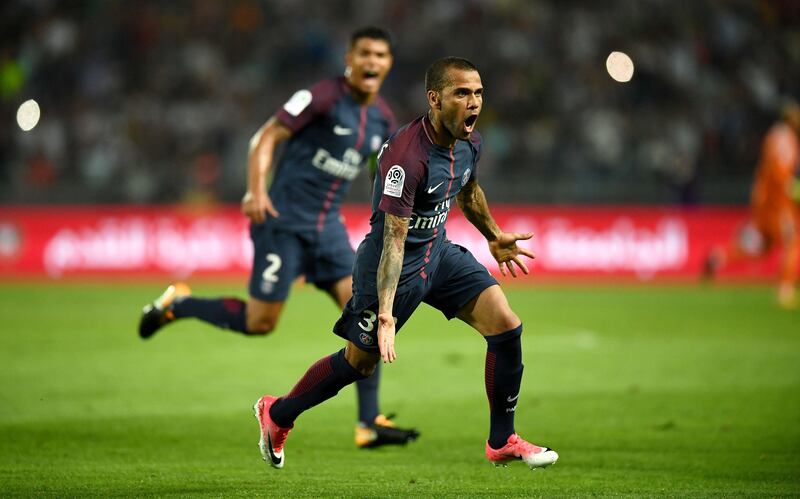Dani Alves had thoroughly thumbed through his guidebook to the French capital in time for his unveiling as Paris Saint-Germain’s latest, eye-catching recruit.
“Paris,” Alves declared, “is the city of love, the most beautiful city in the world.” Then he paused. “I’m here to make my contribution to bringing the club to the level of the city.”
Paris in high summer is indeed seductive, its streets less crowded because so many residents are away on holiday, its gardens in flower.
Alves, the much-travelled serial collector of titles, already feels at home, thanks to his spectacular goal, a long-range free-kick, in the French Super Cup win over Monaco. That trophy was the 34th of his astonishing replete career.
Le superbe but sur coup-franc de @DaniAlvesD2 contre l'@AS_Monaco 🔥🔴🔵 #ASMPSG #TDC2017 🇲🇦 pic.twitter.com/Rkv2eUM3Ug
— Paris Saint-Germain (@PSG_inside) July 30, 2017
Alves, an extrovert, finds himself surrounded in his new dressing room by friends he has known for many years. Being Brazilian at the wealthy, ambitious Ligue 1 superclub is to be in a dominant clique. If, as widely expected, Neymar follows Alves into the club, they might consider renaming themselves Paris Samba-Germain.
Neymar or not, hiring Alves is already a coup for PSG, whose executives purr with satisfaction that the dynamic former Barcelona full-back with the habits of a playmaking attacking midfielder turned down interest from Manchester City to choose France as his next stop.
When Alves remarked, “I am sorry if City feel disappointed I chose PSG. But this club is putting together a great effort to win the [Uefa] Champions League.”
READ MORE:
- Barcelona star Neymar stops off in Dubai as speculation mounts over record move to PSG
Richard Jolly: Neymar could redraw map of European football with move to PSG
Alves has won three of those, with Barcelona, and he was part of the Juventus side who finished second to Real Madrid in the competition’s final in June. His goals and assists in the semi-final against Monaco confirmed that, at 34, he is as influential and energetic as ever.
He remains keen to add plenty to his century of Brazil caps, too, and his compatriots, in this, a World Cup season, will follow PSG’s campaign with especially close interest.
Potentially, no club provides a stronger template for how Brazil approach Russia 2018, a tournament for which they have qualified in some style.
PSG’s defence might well make up 75 per cent of Brazil’s by next June, with Alves the tireless patroller and creator on the right flank, and Thiago Silva, the PSG captain, and Marquinhos manning the central positions. The veteran Brazilian left-back Maxwell has announced his retirement, but he is expected to remain a part of PSG’s management team.
It should not be underestimated how persuasive he was in enticing Alves, who joined from Juve on a free transfer, to Paris. The pair are close, having spent many years as colleagues at Barcelona.
Alves, who will bring his extensive playlist to pre-match preparations in the Parc des Princes, will find the dressing room bows to the authority of not only Silva, but also of Thiago Motta, the Brazil-born midfielder who chose to represent Italy as a senior international.
Motta, once of Barcelona, has added his voice to those of Maxwell and Alves in recommending that Neymar join them. At PSG, he would share a forward line with Lucas Moura, the pacey winger with whom Neymar coincided in Brazil’s silver-medal Olympic team in 2012.
So that is five PSG men for Tite, Brazil’s manager, to keep an eye on over the next 10 months. He will be mindful that national teams who function around a spine of established club colleagues come into major tournaments with advantages.
The Italy squad which won the 2006 World Cup had their Juventus stripes prominent. Spain’s 2010 World Cup triumph was heavily indebted to their many Barcelona players. Germany won the last World Cup with a strong Bayern Munich accent.
And Paris, the city of love, as Alves described it, loves Brazilians. PSG fans of a certain age will recall how the midfielder Rai ran their show in the 1990s. They recall Ronaldinho’s youthful brilliance in their colours at the turn of this millennium.
But they are also sore right now. PSG, despite their vast budget, finished second in Ligue 1 in 2016/17. They lost to Barcelona, dramatically, in the last 16 of the Champions League.
Their boys from Brazil are expected to raise standards, and fast.






